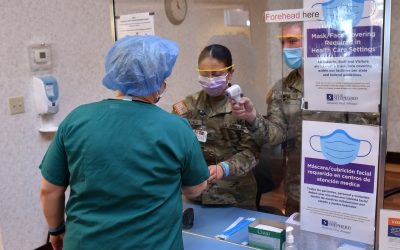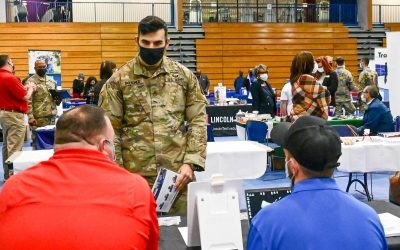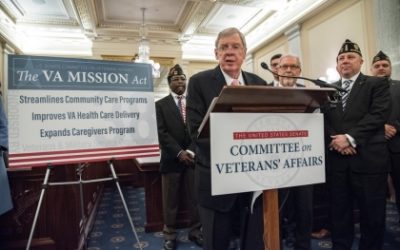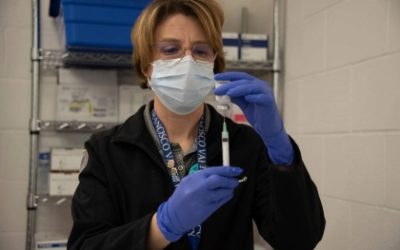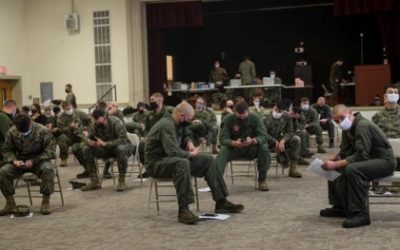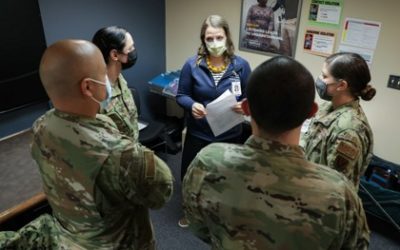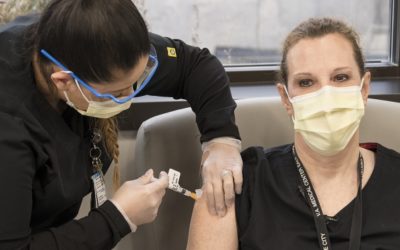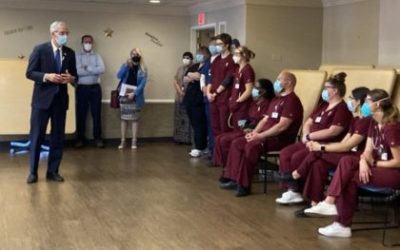For more than two years, the National Guard has risen to the challenges posed by COVID-19 as the pandemic has disrupted lives, supply chains, health care, education and more.
Transition to Civilian Life Remains Difficult Years After Military Discharge
Each year, more than 200,000 servicemembers leave the U.S. military—a transition that can prove difficult.
Hardin’s Mission Is Keeping Veterans Out of Criminal Justice System
Any interaction with the criminal justice system can be a frightening, confusing experience for those being charged. It can be especially difficult to navigate for men and women who are homeless or struggling with mental health or substance abuse issues.
Expanded Role for MTFs Could Improve Obstetric Care in Underserved U.S. Areas
If military treatment facilities offered emergency cesarean delivery and other high-quality obstetric care to civilians in underserved areas of the United States, according to a new study, it would not only significantly improve the health of expectant mothers and their babies but also potentially improve military readiness.
Who Receives Video Telemental Health Services at VA? It Depends.
Across specialties, the COVID-19 pandemic has prompted an unprecedented shift toward the use of telemedicine. At the same time, the pandemic has produced a surge in demand for mental health services, as depression and anxiety have dramatically increased.
Dry Eye Worse in Veterans With GWI
Veterans with Gulf War illness (GWI) have more severe dry eye (DE) symptoms, including neuropathic eye pain questionnaire scores, when compared to those who served during the Gulf War but did not meet criteria for GWI.
Omicron Variant Surge Causes Disruptions in VA, DoD Health Systems
The surge in COVID-19 cases created by the omicron variant has caused no small amount of chaos for federal healthcare agencies, resulting in the postponement of major projects, deployment of emergency medical staff and even the infection and subsequent quarantining of agency leaders.
VA OIG Questions VA’s Data on Ability to Provide Specialty Healthcare
Part of the VA MISSION Act of 2018 required VA to conduct a nationwide audit of its healthcare system’s capacity, identify gaps in care and make recommendations for modernizing or realigning VA facilities to fill those gaps.
Conference Highlights Concerns About Increased CV Risk Factors in Veterans
New research is adding to the evidence that veterans are at increased risk for cardiometabolic conditions and poor cardiovascular outcomes.
VA Gets Approval for 10th Information Technology Chief in Last Decade
VA’s new assistant secretary for the Office of Information Technology and Chief Information Officer is the 10th executive to serve in that post in as many years.
Criticism Continues About VA’s Handling of Military Sexual Trauma Claims
Has the VA improved its process of dealing with military sexual trauma, or are errors resulting in veterans being denied the care they need?
McDonough Denies That Veterans Are Improperly Refused Community Care
Media reports that veterans were being denied community care for financial reasons once again raised questions about how the Mission Act is being administered.
How one VAMC Pharmacy Implemented Gravimetric IV Workflow Technology
For years, the Institute of Safe Medical Practices and other safety groups have been staunch advocates of technology solutions such as gravimetric verification of drug and diluent volumes and have strongly encouraged their implementation to augment manual processes and provide additional safeguards during sterile compounding.
VA Secretary Warns of Hard Conversations Ahead on Agency Resources
VA Secretary Denis McDonough vowed to legislators that the agency will use the lessons it learned during COVID-19 to make the agency stronger going forward.
Military Begins Discharges of Servicemembers Refusing COVID-19 Vaccines
Most active-duty U.S. servicemembers had been vaccinated against COVID-19 by mid-December, when the Army set its deadline.
VA Study: TNF Inhibitors Have Potential Long-Term Effect on Dementia Risk
Alzheimer’s disease (AD) is a global health problem for which there are no disease-modifying therapies.
Who Are Homeless Veterans and What Do They Really Need?
This city is home to the largest VAMC in the nation, as well the single largest population of U.S. veterans. Yet about 4,000 of the vets who call Los Angeles home actually have no home.
DoD Will Provide Medical Workers to Help Civilian Hospitals Fight Omicron
In response to the surge of COVID-19 cases related to the omicron variant, President Joe Biden said that an additional 1,000 military medical personnel would be available to aid civilian hospitals in the United States by early this year.
Dinardo Urges VA Physicians to Consider All Possibilities With Diagnoses
A clinician’s mind leaps to a diagnosis. It matches the symptoms; it wouldn’t be that unusual for a patient of that age; it seems the most likely solution to the answers that both veteran and physician are seeking.
OIG: VA Aware of Scheduling System Issues Before Second VAMC Rollout
VA knew of problems with its new scheduling system prior to its implementation at the Chalmers P. Wylie VA Ambulatory Care Center in Columbus, OH, and later at the Mann-Grandstaff VAMC in Spokane, WA, but failed to fix them before going live at the two facilities, according to a report released last month.
VHA Continues to Provide Too Many Low-Value Prostate Cancer Screening
Low-value healthcare is defined as practices or procedures without clear benefit or where potential harm outweighs the benefit. Deciding what is and isn’t low-value care can be especially difficult when it comes to cancer screenings; increasing age, greater illness burden or lower life expectancy—all weigh on decision-making.
VA Continues to Struggle With Medical/Surgical Inventory Management
VA’s new inventory management system being piloted at the James A. Lovell Federal Health Care Center in Chicago is failing to meet many of the facility’s needs, according to agency overseers.
VA Care Patterns Shifted Dramatically Because of Pandemic, Mission Act
Like other healthcare systems, the VHA has faced unprecedented challenges in responding to the COVID-19 pandemic. A new study provides a broad look at how VA care patterns have shifted since the start of the pandemic.
Nearly All VA Employees Comply with Federal COVID-19 Vaccine Requirements
Nearly all, 98%, of VA employees facing a COVID-19 vaccination requirement have had at least one dose of vaccine or have requested an exception or extension, according to White House data released just before Thanksgiving.
VA Officials Face Hostile Legislators Complaining of Agency’s ‘Broken Culture’
VA has been criticized as suffering from a “broken culture” where employees do not feel comfortable coming forward about safety concerns, resulting in problems going unresolved and tragedies that could have been prevented.
Committee Hearing: DoD/VA Transition Program for Women Not Enough
In recent years, both VA and DoD have worked to create transition services designed specifically for women servicemembers with the goal of providing information about VA care and closing the gap between when a servicemember is discharged and when they enroll for VA healthcare and benefits.
Senator Continues Push to Create More Joint DoD/VA Healthcare Facilities
The James A. Lovell Federal Health Care Center in Chicago is the only joint DoD/VA healthcare facility in operation—a partnership between VA and the Navy. With a gentle push from Congress, that might change in the not-too-distant future.
Survey: VA EHR Deployment Drove Down Staff Morale at Spokane VAMC
Despite lingering problems with the deployment of its new electronic medical record system at the Mann-Grandstaff VAMC in Spokane, VA, officials said the department is still on track to deploy the system in Columbus, OH, early in 2022.
VA Efforts to Secure Its IT System Hampered by Congressional Doubts
For years, VA has struggled to secure its IT systems, with cybersecurity appearing as a persistent weakness in inspectors’ reports.
The department has said it believes that one of the steps toward making progress is addressing the buildup of outdated technology and software, or “technical debt,” that VA has accrued over the decades. VA estimates the total cost of fixing that current debt at $1.3 billion.
VA Commissions Independent Cost Analysis of EHR Modernization Overruns
After underreporting the cost of its Electronic Health Record Modernization (EHRM) project by billions, VA is undertaking an independent cost analysis that is estimated to take as long as 12 months to complete.

